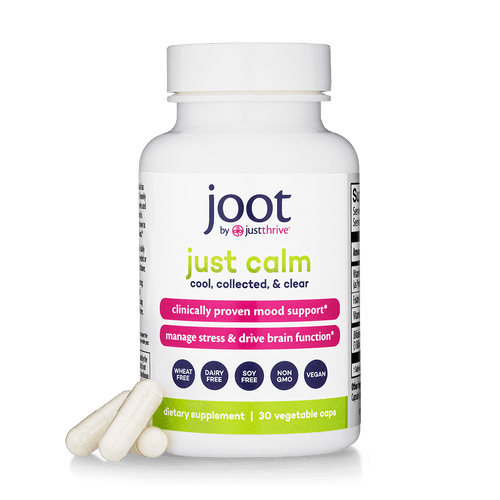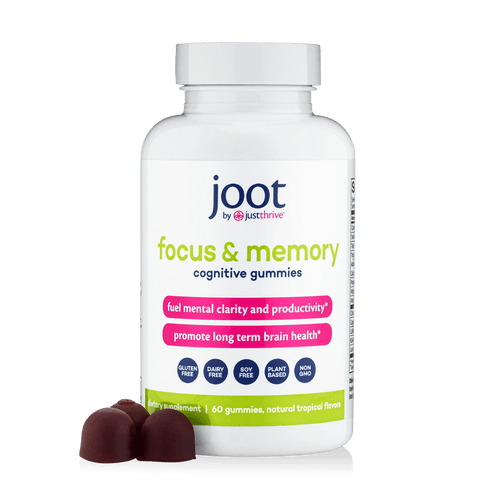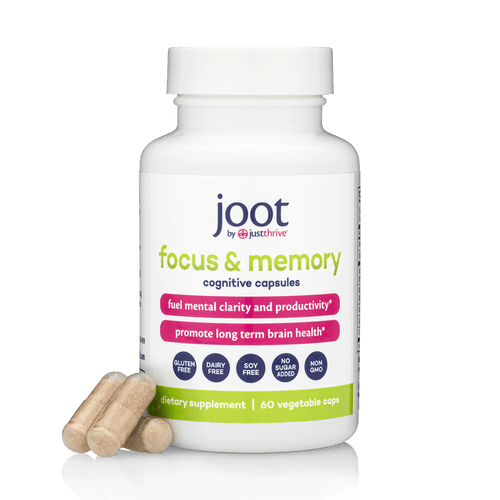Take a quick moment to think about something you’re grateful for…then pat yourself on the back.
You JUST (like right now!) sparked a bunch of mental and physical health benefits!
Crazy as it sounds, the act of "feeling grateful" can have a profound effect on your well-being. In fact, hundreds of studies have found that gratitude connects to:
- Better sleep
- Reduced depression and anxiety
- Improved heart health
- Lower blood pressure
- Fewer aches and pains
- Clearer skin
- Reduced stress levels
- Increased positivity and happiness
Even more surprisingly, it can also have a positive effect on your gut microbiome—the trillions of bacteria that live in your gut, and play a starring role in your overall health.
The Gratitude Difference
Gratitude is more than a “thank you.” It’s a complex emotion that involves:[1]
- Recognizing that something good has happened to you
- Showing appreciation for the gifts you’ve received
- Connecting with something outside yourself
- Strengthening bonds between people
Gratitude affects our brains—and our health—more powerfully than other types of positive emotions. And positive emotions send strong signals to your gut microbiome, allowing the most beneficial bacteria to thrive.
Getting Healthier with Gratitude
No matter what shape your health is in, regularly practicing gratitude can make it better. And there’s a lot of science to back that up! Check this out:
- Heart failure patients (with no active symptoms) who kept gratitude journals had lower levels of inflammation and better heart function than patients who didn’t.[2]
- Keeping a daily online gratitude journal for two weeks was shown to help participants achieve fewer headaches, less congestion, and decreased stomach pain.[3]
- College students who kept gratitude journals for 10 weeks experienced fewer symptoms (like sore muscles or nausea) than students writing about hassles or keeping daily event logs.[4]
- A study of 607 adults found that practicing gratitude was linked to lower levels of loneliness and stress and better overall health.[5]
And one of the most important ways gratitude can improve your health is in the positive way it affects your gut microbiome.
The Gut-Brain Connection Works Both Ways
Many studies show that balancing your gut microbiome with probiotics leads to positive changes in your brain chemistry.[6] And that affects how you think and feel, your memory, and your moods.
That’s because your brain and your gut are directly connected by the “gut-brain axis”— a special communication system that runs between the two. The vagus nerve is the main messaging pathway of the gut-brain axis. And while a lot of recent research has focused on the bottom-up impact (how your gut microbiome affects your brain), the gut-brain axis is a two-way street. All of that makes sense when you think about things like emotional eating, gut feelings, and butterflies in your stomach.
So, the truth is that how you think and feel can change the makeup of your microbiome! For example:
- Social stress can cause gut inflammation and affect gut bacteria and how they behave.[7]
- Depression can change the bacteria population and diversity in the gut microbiome.[8]
- Positive thinking can alter the symptoms of gut-related conditions like IBS.[9]
So, it’s clear that your brain sends messages to your gut.
And when you’re feeling happy and content—in part by practicing gratitude and being grateful—your brain lets your gut know that everything is okay! It sends an “all is well” signal through the vagus nerve to your gut, allowing the beneficial bacteria in your microbiome to thrive, leaving less room for bad (pathogenic) bacteria…all leading to better gut health!
And nothing sets the stage for those beneficial bacteria better than spore probiotics— the best partner for your gratitude practice.
It’s Easy to Practice Gratitude
As we’ve seen in the above-mentioned studies, spending just a few minutes practicing gratitude every day can benefit your mood, your health, and your microbiome.
Then, as you strengthen your gratitude “muscle,” you may find that the feeling sneaks into your mind and heart all throughout the day. Ahhhhh…feeling grateful to feel grateful!
Try Gratitude on for Size: Ways to Chart Gratitude
Want to get started tracking your own gratitude? Choose a method that feels comfortable for you, so you can start reaping the benefits—and have even more to feel grateful for.
Get (or create) a gratitude journal, and spend a few minutes each day writing down the things that you feel grateful for. It helps to have a special place to record your appreciation.
Then, set a goal for yourself…say, start with writing every day for two weeks. (Tip: The most successful studies lasted for at least six weeks, with a longer gratitude practice bringing stronger positive health results).
But if you miss a day or two, don't get discouraged! Building a new habit takes time, and no one is perfect. Give yourself grace, and keep moving forward!
Your Microbiome Will Be Grateful for Just Thrive
Give your gut the greatest gift with Just Thrive Probiotic. This clinically studied blend of four spore probiotics helps a wide variety of beneficial bacteria grow and flourish in your microbiome.
By including Just Thrive Probiotic and gratitude in your routine, you’ll be supporting your physical and mental health and a better quality of life.
>> Nourish your body and mind with Just Thrive Probiotic today.
And if you’re feeling unsure about trying the Just Thrive Probiotic, we can help with that.
EVERY Just Thrive purchase is covered by our Bottom of the Bottle, 100% money back guarantee.
So you can try the it to see if they works for you… and we're confident it will.
But if for any reason you don’t feel a difference, simply ask for a full product refund at any time. Even if it’s been 3 months or 3 years. Even if the bottle is empty!
Sources
- Greater Good Magazine. Gratitude defined. Accessed March 5, 2025. https://greatergood.berkeley.edu/topic/gratitude/definition
- Mills PJ, Redwine L, Wilson K, et al. The Role of Gratitude in Spiritual Well-being in Asymptomatic Heart Failure Patients. Spiritual Clin Pract (Wash D C ). 2015;2(1):5-17. doi:10.1037/scp0000050
- Simon-Thomas ER. A “Thnx” a day keeps the doctor away. Greater Good Magazine. Published December 19, 2012. Accessed March 5, 2025. https://greatergood.berkeley.edu/article/item/a_thnx_a_day_keeps_the_doctor_away
- Allen S. Is gratitude good for your health? Greater Good Magazine. Published March 5, 2018. Accessed March 5, 2025. https://greatergood.berkeley.edu/article/item/is_gratitude_good_for_your_health
- O'Connell BH, Killeen-Byrt M. Psychosocial health mediates the gratitude-physical health link. Psychol Health Med. 2018;23(9):1145-1150. doi:10.1080/13548506.2018.1469782
- Bagga D, Reichert JL, Koschutnig K, et al. Probiotics drive gut microbiome triggering emotional brain signatures. Gut Microbes. 2018;9(6):486-496. doi:10.1080/19490976.2018.1460015
- Maltz RM, Keirsey J, Kim SC, et al. Social Stress Affects Colonic Inflammation, the Gut Microbiome, and Short-chain Fatty Acid Levels and Receptors. J Pediatr Gastroenterol Nutr. 2019;68(4):533-540. doi:10.1097/MPG.0000000000002226
- Liu L, Zhu G. Gut-Brain Axis and Mood Disorder. Front Psychiatry. 2018;9:223. Published 2018 May 29. doi:10.3389/fpsyt.2018.00223
- Kaptchuk TJ, Friedlander E, Kelley JM, et al. Placebos without deception: A randomized controlled trial in irritable bowel syndrome. PLoS One. 2010;5(12):e15591. doi:10.1371/journal.pone.0015591














